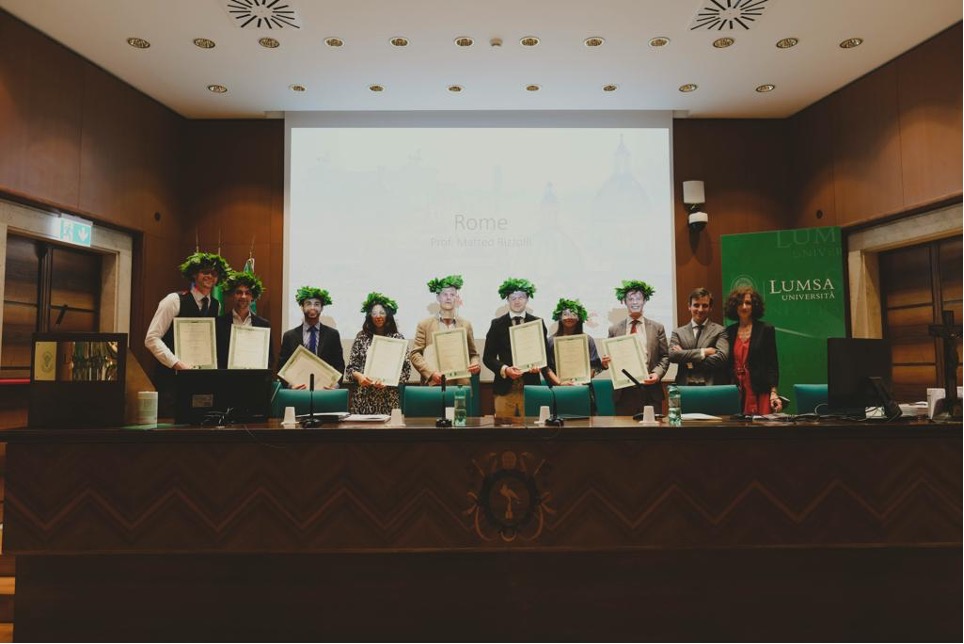STRUCTURE
We live in a regulated world. Regulation is everywhere and affects our choices and behaviour, as well as those whose services and products we use. The course provides a unique educational opportunity to understand how regulation is shaped and implemented and how to improve it as citizens or as L&E experts. The course deals specifically with the notion of better regulation and with the tools necessary to attain it. It covers all stages of the regulatory process and examines not merely how regulation ought to be carried out and evaluated, but also how it may be enriched to draft effective regulation.
Better Regulation is a multidisciplinary course of 20 hours. The course suggests an original and contemporary approach to better regulation tools, re-framed in the light of behavioral insights, as well as by embracing artificial intelligence as a tool to improve the quality of regulation. A transnational approach is followed, which adopts the EU experience as the main model, adequately improved for national and sub-national decision-makers. The instruments of better regulation are addressed theoretically and through specific exercises, and their pros and cons are discussed. Moreover, throughout the course, participants will be exposed to real regulatory problems and better regulation tools by participating in consultation processes and encountering leading better regulation experts in the field.
PROGRAMME
|
Teachers |
Activity |
Day |
Time |
Room |
|---|---|---|---|---|
|
Rizzolli & Rangone |
Online Thesis meeting |
31/1/2025 |
|
Online |
|
Rizzolli & Rangone |
Kick-off meeting in Rome |
22/4/2025 |
19:00 |
LUMSA |
|
Week 1: Experimental law & economics |
||||
|
Rizzolli |
Exp. L&E |
23/4/2025 |
14:00 – 16:00 |
Room n. 17 - Via Giuseppe Gioacchino Belli, 86 |
|
Rizzolli |
Exp. L&E |
24/4/2025 |
14:00 – 16:00 |
Room 9 - via Pompeo Magno, 28 |
|
Week 2 |
||||
|
Rizzolli |
Exp. L&E |
29/4/2025 |
14:00 - 17:00 |
Room n. 17 - Via Giuseppe Gioacchino Belli, 86 |
|
Rizzolli |
Exp. L&E |
30/4/2025 |
14:00 - 17:00 |
Room n. 17 - Via Giuseppe Gioacchino Belli, 86 |
|
Week 3 |
||||
|
Giamattei |
Experiments with classex |
5/05/2025 |
14:00 - 17:00 |
Room n. 12 - Via Pompeo Magno, 28 |
|
Giamattei |
Experiments with classex |
6/05/2025 |
Room n. 17 - Via Giuseppe Gioacchino Belli, 86 |
|
|
|
|
|
|
|
|
Rizzolli& Rangone |
Behavioral regulation |
7/05/2025 |
14:00 - 16:00 |
Room n. 17 - Via Giuseppe Gioacchino Belli, 86
|
|
Rizzolli& Rangone |
Behavioral regulation |
8/05/2025 |
14:00 - 16:00 |
Room 9 - via Pompeo Magno, 28 |
|
Rizzolli& Rangone |
Behavioral regulation |
13/05/2025 |
14:00 - 16:00 |
Room 9 - via Pompeo Magno, 28
|
|
Behavioral regulation |
14/05/2025 |
14:00 - 16:00 |
Room n. 5 - Via Giuseppe Gioacchino Belli, 86 |
|
|
Rangone& Rangone |
Behavioral regulation |
16/05/2025 |
14:00 - 16:00 |
Room 9 - via Pompeo Magno, 28
|
|
Rizzolli |
Behavioral regulation |
21/05/ 2025 |
16:00 - 18:00 |
Room 12 - via Pompeo Magno, 28 |
|
Behavioral regulation |
22/05/2025 |
16:00 - 18:00 |
Room 12 - via Pompeo Magno, 28 |
|
|
Rangone |
Better Regulation |
23/05/2025 |
16:00 - 18:00 |
Room 12 - via Pompeo Magno, 28 |
|
|
|
|
|
|
|
Rangone |
Better Regulation |
26/05/2025 |
16:00 - 18:00 |
Presidency of the council of Ministries (p.zza Colonna 370) |
|
|
|
28/05/2025 |
16:00 - 18:00 |
Room 12 - via Pompeo Magno, 28 |
|
Rizzolli & Rangone |
Better Regulation |
30/05/2025 - might be anticipated to 29/05/2025 |
16:00 - 18:00 |
Room 12 - via Pompeo Magno, 28 |
|
|
|
|
|
|
|
Rangone |
Better Regulation |
3/06/2025 |
16:00 - 18:00 |
Room 12 - via Pompeo Magno, 28 |
|
Rangone |
Better Regulation |
4/06/2025 |
16:00 - 18:00 |
Room 12 - via Pompeo Magno, 28 |
|
Rangone |
Better Regulation |
6/06/2025 |
16:00 - 18:00 |
Room 12 - via Pompeo Magno, 28 |
|
WEEK 8 |
||||
|
|
Thesis Meeting - Roundtable EMLE - Rome alumni |
10/06/2024 |
16:00 - 18:00 |
Room 12 - via Pompeo Magno, 28 |
|
|
EXAM Better Regulation |
13/06/2025 |
14:00 - 17:00 |
Room 17 - Via Giuseppe Gioachino Belli, 86 |
|
|
EXAM Exp. L & E |
17/06/2025 |
16:00 - 19:00 |
Room 12 - via Pompeo Magno, 28 |
TEACHING METHODS AND ASSESSMENTS
Students are involved in interactive lessons (e.g., based on in-class exercises and the participation to real consultation process), as well as in dialogues with professionals and experts (e.g.,, seminars on “law and regulation in action” and a meeting with the Italian Regulatory Scrutiny Board).
In-class exercises. Those are graded on a scale from 1 to 10. Each activity is weighted differently depending on the commitment required. The exercises are organised as follows:
- Nudging and empowerment (20 %).
- Simulation of an impact assessment (40 %).
- Participation in a real consultation process (40 %).
Final assessment. The final assessment is framed as a regulatory problem to be solved. It is written and is meant to verify the understanding and acquisition of critical thinking skills. Students are asked to solve problems related to major class topics. It is graded from 0 to 10.
Final grade: 85% final assessment + 15 % in-class exercises.
FINAL THESIS (FOR EMLE STUDENTS ONLY)
Hereafter is a list of topics for which the final thesis can be requested to the course holder or experts from the university teaching staff or partners.
- Artificial intelligence for rule-making and law-making.
- Artificial intelligence regulation.
- Behavioural regulation.
- Regulatory delivery.
- Risk-based regulation.
- Digital markets regulation.
- Corruption prevention.
- Lobbying.
- Consultations and stakeholders’ inclusion tools
- Ex post evaluation.
- Regulatory Impact Assessment.
- Drafting.
- Participative and deliberative democracy.
- Simplification.
- Regulatory sandboxes.
- Regulatory and administrative burden measurement.
- Soft regulation.
- Competition advocacy and enforcement.
- Transparency.
Additionally, each year, EMLE associated partners can propose topics/titles on which they have an interest in supervising theses through their representatives. The topics/titles will be shared in November/December.
GENERAL AND INTERACTIVE CALENDAR
The following calendar can be added to your personal google calendar by clicking at the bottom right-hand corner.
REFERENCES
- Sunstein, C. (2023), Advanced introduction to Behavioral law and Economics, EE publishing.
- Baldwin R., Cave M. (2021), Taming the corporation. How to regulate for success, OUP
- Blanc F. (2020), Regulation, Regulatory Delivery, Trust and Distrust, in De Benedetto M., Lupo N., and Rangone N. (eds.), The crisis of confidence in legislation (Nomos/Hart)
- Thaler R.H., Sunstein C.R. (2021), Nudge. The final edition, Penguin
- Zamir E, Techman D. (2021), Behavioural law and economics, OUP
(a final reference list of papers is provided at the beginning of the course)
INTERNSHIP OPPORTUNITIES
Excellent professional contacts are provided thanks to internship opportunities with EMLE associated partners, i.e. AGCOM (the Italian authority for electronic communication regulation and supervision), CONSOB (the Italian authority for financial markets regulation and supervision), GSE (the Italian public-owned company responsible for the promotion of renewable resources); LEAR (a specialized economic consultancy that offers services in the field of competition policy, regulation and procurement); CIMEA - Centro Informazioni Mobilità Equivalenze Accademiche
Students might also profit from other internship opportunities related to the Jean Monnet Chair on EU approach to better regulation
Job opportunities might come from invited experts as well. For instance, four EMLE students are currently working for the OECD and at the ASTRID foundation.
CONTACTS
CHAIRHOLDER

Nicoletta Rangone
(n.rangone@lumsa.it)



